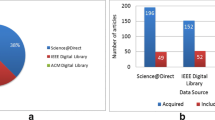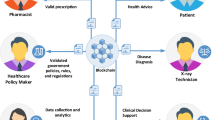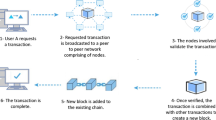Abstract
Blockchain overcomes numerous complicated problems related to confidentiality, integrity, availability of fast and secure distributed systems. Using data from a cross-sectoral survey of 449 industries, we investigate factors that hinder or facilitate blockchain adoption in supply chains. To capture the most vital aspects of blockchain adoption in supply chains, our conceptual model integrates the unified theory of acceptance and use of technology (UTAUT) model with the task-technology fit (TTF) and information system success (ISS) models, with trust-based information technology innovation adoption constructs. Using structural equation modelling, we find that the ISS, TTF, and UTAUT models positively influence the key factors affecting supply chain employees’ willingness to adopt blockchain. Our results show that the UTAUT’s social influence factor has no significant effect on the intention to adopt blockchain, while inter-organisational trust has a significant effect on the relationship between the UTAUT dimension and intention to adopt blockchain.

Source Developed by authors based on literature review

Source Developed by authors based on PLS-SEM results
Similar content being viewed by others
References
Berdik, D., Otoum, S., Schmidt, N., Porter, D., Jararweh, Y.: A survey on blockchain for information systems management and security. Inform. Process. Manage. 58(1), 102397 (2012)
Tseng, L., Wong, L., Otoum, S., Aloqaily, M., Othman, J.B.: Blockchain for managing heterogeneous internet of things: a perspective architecture. IEEE Netw. 34(1), 16–23 (2020)
Alazab, M., Venkatraman, S., Watters, P., Alazab, M., Alazab, A.: Cybercrime: The Case of Obfuscated Malware. In: Georgiadis, C., Jahankhani, H., Pimenidis, E., Bashroush, R., Al-Nemrat, A. (eds.) Global security, safety and sustainability & e-democracy, vol. 99, pp. 204–211. Springer, Berlin (2012)
Alazab, M., Venkatraman, S., Watters, P., Alazab, M.: Information security governance: the art of detecting hidden malware. In: IT Security Governance Innovations: Theory and Research. pp. 293–315. IGI Global (2013)
Maleh, Y., Shojafar, M., Alazab, M., Romdhani, I.: Blockchain for Cybersecurity and Privacy: Architectures, Challenges, and Applications. CRC Press, Boca Raton (2020)
Cole, R., Stevenson, M., Aitken, J.: Blockchain technology: implications for operations and supply chain management. Supp. Chain Manage. 24(4), 469–483 (2019)
Tseng, L., Yao, X., Otoum, S., Aloqaily, M., Jararweh, Y.: Blockchain-based database in an IoT environment: challenges, opportunities, and analysis. Clust. Comput. 21, 1–15 (2020)
Niranjanamurthy, M., Nithya, B., Jagannatha, S.: Analysis of blockchain technology: pros, cons and SWOT. Clust. Comput. 22(6), 14743–14757 (2019)
Khalid, U., Asim, M., Baker, T., Hung, P.C., Tariq, M.A., Rafferty, L.: A decentralized lightweight blockchain-based authentication mechanism for IoT systems. Clust. Comput. 14, 1–21 (2020)
Kim, J.-S., Shin, N.: The impact of blockchain technology application on supply chain partnership and performance. Sustainability 11(21), 6181 (2019)
Salmerón-Manzano, E., Manzano-Agugliaro, F.: The role of smart contracts in sustainability: worldwide research trends. Sustainability 11(11), 3049 (2019)
Bodkhe, U., Tanwar, S., Parekh, K., Khanpara, P., Tyagi, S., Kumar, N., Alazab, M.: Blockchain for industry 40: a comprehensive review. IEEE Access 8, 79764–79800 (2020)
Alkhalifah, A., Ng, A., Kayes, A., Chowdhury, J., Alazab, M., Watters, P.: A taxonomy of blockchain threats and vulnerabilities. Preprints (2019).
Alazab, M., Venkatraman, S., Watters, P., Alazab, M.: Zero-day malware detection based on supervised learning algorithms of API call signatures. In: Ninth Australasian Data Mining Conference: AusDM 2011, Ballarat, (2011), pp. 171–181
Alazab., M., Alazab., A., Batten., L.: Smartphone malware based on synchronisation vulnerabilities. In: ICITA 2011: Proceedings of the 7th International Conference on Information Technology and Applications, Sydney, (2012), pp. 1–6. ICITA
DYBLE, J.: Global blockchain in supply chain market to reach $424mn by 2023. https://www.supplychaindigital.com/technology/global-blockchain-supply-chain-market-reach-424mn-2023 (2018). Accessed March. 30 2020
Edwards, C., Hopkins, J.: The Australian supply chain tech survey. https://sclaa.com.au/wp-content/uploads/2018/04/The-Australian-Supply-Chain-Tech-Survey.pdf (2018). Accessed January. 06 2020
Hald, K.S., Kinra, A.: How the blockchain enables and constrains supply chain performance. Int. J. Phys. Distrib. Logist. Manage. 49(4), 376–397 (2019)
Queiroz, M.M., Wamba, S.F.: Blockchain adoption challenges in supply chain: an empirical investigation of the main drivers in India and the USA. Int. J. Inf. Manage. 46, 70–82 (2019)
Cao, D., Tao, H., Wang, Y., Tarhini, A., Xia, S.: Acceptance of automation manufacturing technology in China: an examination of perceived norm and organizational efficacy. Product. Plan. Control 31(8), 660–672 (2020)
Kamble, S., Gunasekaran, A., Arha, H.: Understanding the Blockchain technology adoption in supply chains-Indian context. Int. J. Prod. Res. 57(7), 2009–2033 (2019)
Wang, Z., Yang, L., Wang, Q., Liu, D., Xu, Z., Liu, S.: ArtChain: blockchain-enabled platform for art marketplace. In: 2019 IEEE International Conference on Blockchain (Blockchain) 2019, pp. 447–454. IEEE
Chukwu, E., Garg, L.: A systematic review of blockchain in healthcare: Frameworks, prototypes, and implementations. IEEE Access 8, 21196–21214 (2020)
Kshetri, N.: 1 Blockchain’s roles in meeting key supply chain management objectives. Int. J. Inf. Manage. 39, 80–89 (2018)
Saberi, S., Kouhizadeh, M., Sarkis, J., Shen, L.: Blockchain technology and its relationships to sustainable supply chain management. Int. J. Prod. Res. 57(7), 2117–2135 (2019)
Alazab, M.: Analysis on smartphone devices for detection and prevention of malware. Deakin University (2014)
Alazab, A., Hobbs, M., Abawajy, J., Alazab, M.: Using feature selection for intrusion detection system. In: 2012 International Symposium on Communications and Information Technologies (ISCIT), pp. 296–301. IEEE (2012)
Helo, P., Hao, Y.: Blockchains in operations and supply chains: a model and reference implementation. Comput. Ind. Eng. 136, 242–251 (2019)
Thiruchelvam, V., Mughisha, A.S., Shahpasand, M., Bamiah, M.: Blockchain-based technology in the coffee supply chain trade: case of burundi coffee. J. Telecommun. Electr. Comput. Eng. 10(3–2), 121–125 (2018)
Maroun, E.A., Daniel, J.: Opportunities for use of blockchain technology in supply chains: Australian manufacturer case study. In: International Conference on Industrial Engineering and Operations Management Bangkok, pp. 1603–1613 (2019)
Maroun, E.A., Daniel, J., Fynes, B.: Adoption of blockchain technology in supply chain transparency: Australian manufacturer case study. In: 10th Annual European Decision Sciences Conference Decision Sciences in a Connected World University of Nottingham (2019)
Maroun, E.A., Daniel, J., Zowghi, D., Talaei-Khoei, A.: Blockchain in supply chain management: Australian manufacturer case study. In: Service Research and Innovation. pp. 93–107. Springer (2018)
Francisco, K., Swanson, D.: The supply chain has no clothes: technology adoption of blockchain for supply chain transparency. Logistics 2(1), 2–13 (2018)
Knauer, F., Mann, A.: What is in it for me? Identifying drivers of blockchain acceptance among German consumers. J. Brit. Blockchain Assoc. 3(1), 1–16 (2019)
Chang, Y., Iakovou, E., Shi, W.: Blockchain in global supply chains and cross border trade: a critical synthesis of the state-of-the-art, challenges and opportunities. Int. J. Prod. Res. 58(7), 2082–2099 (2019)
Maruping, L.M., Bala, H., Venkatesh, V., Brown, S.A.: Going beyond intention: Integrating behavioral expectation into the unified theory of acceptance and use of technology. J. Assoc. Inform. Sci. Technol. 68(3), 623–637 (2017). https://doi.org/10.1002/asi.23699
Venkatesh, V., Thong, J., Xu, X.: Consumer acceptance and use of information technology: extending the unified theory of acceptance and use of technology. MIS Quart. 36(1), 157–178 (2012)
Taherdoost, H.: A review of technology acceptance and adoption models and theories. Procedia Manuf. 22(1), 960–967 (2018)
Venkatesh, V., Morris, M., Davis, G., Davis, F.: User acceptance of information technology: toward a unified view. MIS Quart. 27(3), 425–478 (2003)
Tarhini, A., Alalwan, A.A., Shammout, A.B., Al-Badi, A.: An analysis of the factors affecting mobile commerce adoption in developing countries. Rev. Int. Bus. Strategy 29(3), 157–179 (2019)
Lin, X., Wu, R., Lim, Y.-T., Han, J., Chen, S.-C.: Understanding the sustainable usage intention of mobile payment technology in Korea: cross-countries comparison of Chinese and Korean Users. Sustainability 11(19), 5532 (2019)
Thatcher, J.B., McKnight, D.H., Baker, E.W., Arsal, R.E., Roberts, N.H.: The role of trust in postadoption IT exploration: an empirical examination of knowledge management systems. IEEE Trans. Eng. Manage. 58(1), 56–70 (2010)
Suifan, T., Alazab, M., Alhyari, S.: Trade-off among lean, agile, resilient and green paradigms: an empirical study on pharmaceutical industry in Jordan using a TOPSIS-entropy method. Int. J. Adv. Operat. Manag. 11(1–2), 69–101 (2019)
Alqudah, S., Shrouf, H., Suifan, T., Alhyari, S.: A moderated mediation model of lean, agile, resilient, and green paradigms in the supply chain. Int. J Sup. Chain. Mgt. 9(4), 1–16 (2020)
Delone, W., McLean, E.R.: The DeLone and McLean model of information systems success: a ten-year update. J. Manage. Inform. Syst. 19(4), 9–30 (2003). https://doi.org/10.1080/07421222.2003.11045748
Suifan, T.S., Diab, H., Alhyari, S., Sweis, R.J.: Does ethical leadership reduce turnover intention? The mediating effects of psychological empowerment and organizational identification. J. Hum. Behav. Soc. Environ. 30(4), 410–428 (2020)
Wamba, S.F., Queiroz, M.M.: The role of social influence in blockchain adoption: the Brazilian supply chain case. IFAC-PapersOnLine 52(13), 1715–1720 (2019)
Suifan, T.S., Alhyari, S., Sweis, R.J.: A moderated mediation model of intragroup conflict. Int. J. Confl. Manage. 31(1), 91–114 (2019)
Alazab, M.: Automated malware detection in mobile app stores based on robust feature generation. Electronics 9(3), 435 (2020)
Dujak, D., Sajter, D.: Blockchain applications in supply chain. In: SMART Supply Network. pp. 21–46. Springer (2019)
Suifan, T., Saada, R., Alazab, M., Sweis, R., Abdallah, A., Alhyari, S.: Quality of information sharing, agility, and sustainability of humanitarian aid supply chains: an empirical investigation. Int. J Sup. Chain. Mgt. 9(5), 1–13 (2020)
Dwivedi, Y.K., Rana, N.P., Jeyaraj, A., Clement, M., Williams, M.D.: Re-examining the unified theory of acceptance and use of technology (UTAUT): towards a revised theoretical model. Inform. Syst. Front. 21(3), 719–734 (2019)
Alhyari, S., Alazab, M., Venkatraman, S., Alazab, M., Alazab, A.: Six sigma approach to improve quality in e-services: an empirical study in Jordan. Int. J. Electr. Gov. Res. (IJEGR) 8(2), 57–74 (2012)
Alhyari, S., Alhyari, M.: Toward quality measurement approaches for improving E-government services in Jordan. In: IT in the public sphere: applications in administration, government, politics, and planning. pp. 82–98. IGI Global (2014)
Alhyari, S., Alazab, M., Venkatraman, S., Alazab, M., Alazab, A.: Performance evaluation of e-government services using balanced scorecard. Benchmarking 20(4), 512–536 (2013)
Alazab, M., Batten, L.: Survey in smartphone malware analysis techniques. In: New threats and countermeasures in digital crime and cyber terrorism. pp. 105–130. IGI Global (2015)
Alhyari, S.: Supply chain management paradigms and their impact on competitive priorities: an applied study on Jordanian Airlines Industry. Unpublished PhD thesis, The World Islamic Sciences and Education University (2015)
Alhyari, S., Al-Ali, A.M., Nuseir, M.: Assessing supply chain partnership performance in services organization: conceptual model. Africa Dev Resour Res Inst J 7(2), 1–16 (2014)
Bitcoinexchangeguide: Crypto N Kafe CNK ICO: African coffee trading cryptocurrency? https://dailycoffeenews.com/2018/03/22/starbucks-launching-pilotprogram-for-blockchain-in-its-supply-chain/ (2019). Accessed 3 March 2020
Hakak, S., Khan, W.Z., Gilkar, G.A., Imran, M., Guizani, N.: Securing smart cities through blockchain technology: architecture, requirements, and challenges. IEEE Netw. 34(1), 8–14 (2020)
Bryman: Starbucks launching pilot program for blockchain In: Its supply chain. https://dailycoffeenews.com/2018/03/22/starbucks-launching-pilotprogram-for-blockchain-in-its-supply-chain/ (2018). Accessed 2 March 2020
Goodhue, D.L., Thompson, R.L.: Task-technology fit and individual performance. MIS Quart. 19, 213–236 (1995)
Tam, C., Oliveira, T.: Understanding the impact of m-banking on individual performance: DeLone & McLean and TTF perspective. Comput. Hum. Behav. 61, 233–244 (2016)
Alazab, A., Alazab, M., Abawajy, J., Hobbs, M.: Web application protection against SQL injection attack. In: Proceedings of the 7th International Conference on Information Technology and Applications 2011, pp. 1–7
Supranee, S., Rotchanakitumnuai, S.: The acceptance of the application of Blockchain technology in the supply chain process of the Thai Automotive Industry. In: Proceeding of the 17th International Conference on Electronic Business (ICEB 2017), ITG 2017, pp. 252–257
New, S., Green, K., Morton, B.: An analysis of private versus public sector responses to the environmental challenges of the supply chain. J. Public Procure. 2(1), 93–105 (2002)
Sekaran, U., Bougie, R.: Research Methods for Business: A Skill Building Approach. Wiley, New York (2016)
Lippert, S.K.: Investigating postadoption utilization: an examination into the role of interorganizational and technology trust. IEEE Trans. Eng. Manage. 54(3), 468–483 (2007)
Mentzer, J.T., Lambert, D.M.: Estimating nonresponse bias in mail surveys: a replication study. In: Marketing Horizons: a 1980's Perspective. pp. 222–224. Springer (2015)
Wang, Y.-Y., Wang, Y.-S., Lin, T.-C.: Developing and validating a technology upgrade model. Int. J. Inf. Manage. 38(1), 7–26 (2018)
Hair, J.F., Jr., Hult, G.T.M., Ringle, C., Sarstedt, M.: A primer on Partial Least Squares Structural Equation Modeling (PLS-SEM). Sage Publications, Thousand Oaks, CA (2016)
Hair, J.F., Jr., Sarstedt, M., Hopkins, L., Kuppelwieser, V.G.: Partial least squares structural equation modeling (PLS-SEM). Eur. Bus. Rev. 26(2), 106–121 (2014)
Roldán, J.L., Sánchez-Franco, M.J.: Variance-based structural equation modeling: Guidelines for using partial least squares in information systems research. In: Research Methodologies, Innovations and Philosophies in Software Systems Engineering and Information Systems. pp. 193–221. IGI Global (2012)
Henseler, J.: Partial least squares path modeling. In: Advanced Methods for Modeling Markets. pp. 361–381. Springer (2017)
Henseler, J., Ringle, C.M., Sarstedt, M.: A new criterion for assessing discriminant validity in variance-based structural equation modeling. J. Acad. Mark. Sci. 43(1), 115–135 (2015)
Gan, C., Li, H., Liu, Y.: Understanding mobile learning adoption in higher education. Electron. Library 35, 15 (2017)
Oliveira, T., Faria, M., Thomas, M.A., Popovič, A.: Extending the understanding of mobile banking adoption: when UTAUT meets TTF and ITM. Int. J. Inf. Manage. 34(5), 689–703 (2014)
Alazab, M., Alazab, M., Shalaginov, A., Mesleh, A., Awajan, A.: Intelligent mobile malware detection using permission requests and API calls. Future Gener. Comput. Syst. 107, 509–521 (2020). https://doi.org/10.1016/j.future.2020.02.002
Batten, L.M., Moonsamy, V., Alazab, M.: Smartphone applications, malware and data theft. In: Computational Intelligence, Cyber Security and Computational Models. pp. 15–24. Springer (2016)
Moonsamy, V., Alazab, M., Batten, L.: Towards an understanding of the impact of advertising on data leaks. Int. J. Secur. Netwk. (IJSN) 7(3), 181–192 (2012)
Alazab, M., Monsamy, V., Batten, L., Lantz, P., Tian, R.: Analysis of malicious and benign android applications. In: International Conference on Distributed Computing Systems Workshops (ICDCSW) 32nd 2012, pp. 608–616. IEEE (2012)
Oliveira, T., Thomas, M., Baptista, G., Campos, F.: Mobile payment: understanding the determinants of customer adoption and intention to recommend the technology. Comput. Hum. Behav. 61, 404–414 (2016)
Baker, J., Steiner, J.: Blockchain: The Solution for Transparency in Product Supply Chains. Provenance, London (2015)
Davis, F.D.: Perceived usefulness, perceived ease of use, and user acceptance of information technology. MIS Quart. 13, 319–340 (1989)
Author information
Authors and Affiliations
Corresponding author
Additional information
Publisher's Note
Springer Nature remains neutral with regard to jurisdictional claims in published maps and institutional affiliations.
Rights and permissions
About this article
Cite this article
Alazab, M., Alhyari, S., Awajan, A. et al. Blockchain technology in supply chain management: an empirical study of the factors affecting user adoption/acceptance. Cluster Comput 24, 83–101 (2021). https://doi.org/10.1007/s10586-020-03200-4
Received:
Revised:
Accepted:
Published:
Issue Date:
DOI: https://doi.org/10.1007/s10586-020-03200-4




